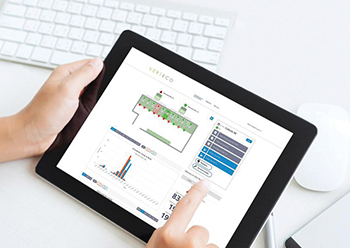Smart washrooms key to safety: Verteco
01 August 2020
Verteco, the UAE’s leading water saving company that offers smart washroom technology, says the fight against the coronavirus must extend to the washroom, highlighting that there is an urgent need to rethink washroom safety standards in high-footfall buildings.
As the world tackles the Covid-19 pandemic, the company says it is aiming to revolutionise the way washrooms of the future will look through the use of its latest smart washroom technology which offers long-term, cost-effective solutions to this pressing need.
Verteco says by introducing smart washrooms, companies will not only achieve long-term cost savings, they can re-think and revolutionise hygiene standards. Its systems offer two major benefits: improved hygiene and increased operational efficiencies.
David King, Managing Director of Verteco, comments: “The need to make public spaces safe post-Covid is vital. Our smart systems monitor the use of consumables, which reduces the need for unnecessary visits and checks by cleaning staff, therefore reducing the amount of surface contact that is needed. This technology offers people in busy places, like malls and airports, safe access to the bathroom and a place where they can hygienically wash their hands. Through the implementation of sensors that monitor taps, flushes, soap and hand towel dispensers, smart washrooms prioritise safety by eliminating the risk of surface contact and therefore reducing the spread of the virus.”
The benefits of a smart washroom go beyond sensor-driven technology. King elaborates: “The system not only increases hygiene levels, it offers cost-effectiveness by reducing operating expenses and running costs. Real-time technology can alert management to an issue before it becomes a problem, and it can allow facilities teams to develop more efficient maintenance schedules. Staff are alerted to decreasing levels of soap or toilet paper, allowing them to be refilled before they become empty, giving environmental efficiencies through reducing waste and improving customer experience.”
Temperature sensors on taps make sure the water is at the correct temperature and can alert staff if a tap hasn’t been used for a long time, to prevent water stagnating and infections such as Legionella from developing, he says. Technology to monitor footfall can send an alert to cleaning staff to allow cleaning and sanitisation schedules to be increased on demand, and real-time occupancy displays can be placed at the entrance to indicate the number of people using the facility, ensuring compliance with social distancing.
“During the pandemic, one of the most important lessons we have learnt is the need for good hand hygiene. Regular and thorough hand washing is one of the best ways we can act to stop the spread of the virus, so a clean, safe washroom is essential. Smart washrooms ensure access to well-stocked and regularly sanitised facilities, which in turn increases user experience. Boosting customer satisfaction will, in the long run, make people feel safer when venturing out,” he concludes.
- Honeywell solutions aim to ensure health
- Smart washrooms key to safety: Verteco
- JLL ties up with SGS to safeguard workplaces
- Optimum air quality ‘vital to hygienic interiors’
- Suprema offers contactless access solutions



